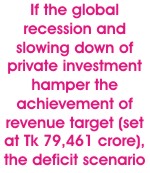
Inside
|
Budget The Good, Bad and the Uncertain Syeed Ahamed gives an overall view of this year’s budget
The budget for the fiscal year 2009-10 (FY2010) has attracted a mixed response and has been termed as bold as well as exaggerated, conservative as well as ambitious, and challenging as well as full of rhetoric by different quarters. While pro-poor allocations and taxation has been appreciated, controversial proposals such as the black money recycling scheme invited widespread criticism. While the budget has taken some traditional stances such as block allocations and high government borrowing, it has also introduced some new approaches such as the public private partnership and economic decentralisation. This article will analyse some good, bad and unknown issues of this year's budget by exploring different budget proposals and post-budget discussions. The good growth recovery To achieve this growth target, the government's forecast of investment efficiency, measured by incremental capital-output ratio (ICOR), may seem odd. It is predicted that the ICOR will increase in 2010, meaning more investment will be required to achieve a similar level of production. There are possibly two explanations behind this projected drop in investment efficiency -- the recession-recovery dynamics, and the lagged response of rural investment. During a recession, private sector is typically reluctant to invest and government often adopts expansionary fiscal stance to revive GDP growth. As a result, the 'projected' ICOR appears low in the context of a modest GDP target. Once the proposed stimulus package and public investment programmes are put into effect, the private sector will recover and the actual investment efficiency will look better in the backdrop of a moderate growth attainment and revised (downward) public investment figures. The budget allocations, which shifted focus from urban-industrialisation to economic devolution and rural development, may reduce the investment efficiency in the short-run as rural development shows a delayed (but sustained) response to investment. A study on China's economic growth between 1978 and 2000 (Journal of Asian Economics, 14, 2003) shows that in the long run, investment efficiency can be reaped through rural industrialisation and proliferation of small firms in non-state sector. The current budget seems to have addressed this stance. Hence, an annual fall in projected ICOR can be ignored if economic devolution can be ensured and a reasonable growth is achieved during the current fiscal year.
Economic devolution On the expenditure side, subsidy for fertiliser and agricultural inputs has been reduced by 37.7 percent from last year's revised budget. Since the price of different fertilisers declined by 30 to 70 percent in the world market over the past several months, the proposed subsidy seems reasonable for the new fiscal year. To facilitate multiple crop production and to expand the cultivable land by improving drainage system in the haor areas, Tk 4000 crore has been allocated. In addition, Tk 280 crore and Tk 185 crore have been allocated for development of high yielding variety seeds and for agricultural research and agricultural rehabilitation assistance. The budget has recapitalised the micro credit institutions (Krishi Banks and Karmashanghstan Bank), increased the fund for housing and SME, and has allocated Tk. 3,575 crore to invest in the construction and reconstruction of roads and bridges under LGED. While the proposed decentralisation of police administration seems pertinent, the setting up of a Public Representative Board to oversee police forces may raise concerns and should be implemented with outmost transparency to stop unwarranted politicisation. Against the above budgetary measures and aims, there are potential worries about economic devolution. Recently, Bangladesh's decentralisation dilemma has taken a new turn. We have moved from the traditional conflict between administrative and political representatives. Now the conflict is between central and local political representatives, i.e. MPs and upazila chairpersons. The major constitutional duty of an MP is to work on policy issues in the legislature, not handling the development programmes. However, given the socio-political context of the country, if the government wants to provide some spending power to the MPs, this should be done under transparent framework without undermining the duties of the upazila representatives. Pro-growth, pro-poor taxation The tax rate for deductions of income tax at source against capital gain from the sale of land has been slashed down from 5 percent to 2 percent in urban areas, whereas a further reduction to 1 percent has been proposed for other areas. It has also reduced the income tax burden on senior citizens by lowering the age bar from 70 years to 65 years. While major food items and fertilisers will continue to enjoy the zero-rate tax, additional duty exemption has been offered for the import of phosphoric acid used for fertiliser production. Duty rate on books (including fictions, novel) has been reduced from 12 percent to 5 percent. More importantly, the budget has reduced the duty on basic raw materials from 7 percent to 5 percent, which will stimulate the local industries. The budget also increased the threshold level for VAT from Tk 24 lakh to Tk 40 lakh to encourage small and medium enterprises. The threshold level for imposing excise duty on bank deposits also increased from Tk 10,000 to Tk On the other hand, the budget imposed tax on personal cars and increased supplementary duty on the imports of luxury vehicles. In addition, 5 percent regulatory duty has been imposed on luxury items falling under 25 percent slab of duty. It increased the supplementary duty on air-conditioners and imposed 25 percent customs duty on mobile phone sets on an 'ad valorem' basis, which will increase the cost of expensive mobile phone sets. On the other hand, a reduction in corporate tax rate for mobile phone operators has been offered with a condition that they will enlist in the stock exchange as a publicly traded company. Overall, the changes in duty rates and duty structures seem pro-poor and pro-growth. The bad The black money recycling proposal overshadowed the post-budget discussions, not only on moral grounds, but predominantly on an economic standpoint. Earlier such schemes were never successful in attracting investment and only created new avenues for tax-dodgers who regularised more black money by paying less tax showing exaggerated investment progra-mmes. Since the penalty is only 10 percent, compared to the 25 percent regular tax, the proposed scheme will encourage the honest tax payers to 'paint' their white money black to get additional tax-cuts. The FBCCI reaffirmed their position on black money and demanded that only legally earned 'undeclared money' should be allowed into investment. The 'no question asked' clause of the scheme should then be withdrawn to scrutinise the sources of the money and Central Intelligence Cell (of the National Board of Revenue) and Anti-Money Laundering Department (of the Bangladesh Bank) should be part of this inspection process. Given the failure of previous schemes and the uncertainty of its prolonged duration, the government should rethink the proposed scheme. However, to address the lack of investment in power and infrastructure and to stop capital flight, the government may consider specific project proposals on a case-by-case basis. In this case, a consortium could commit an amount of previously undisclosed money to invest in a specific project related to power or infrastructure. The government will then scrutinise the sources of the money and if clean, will allow the money to be invested in the project after due penalty. Though one might condemn the stance as an informal means to minimise post-budget criticism, a well-organised budget consultation can reinforce democratic responsiveness too. After all, the budget of the republic is an open document and some organised revelation during pre-budget consultations can be used to better reflect public demands and expert opinions. After the announcement of the last financial year's stimulus package, we have seen the finance minister changing positions in response to demands from different stakeholder groups. We have witnessed how the finance minister has been readjusting on black money recycling scheme amid criticism. If it is responsiveness -- not hesitance -- then pre-budget revelation of proposals and following reactions are good for the budget. However, to limit future confusion, a formal approach towards pre-budget consultation and revelation should be put in place.
Unspecified allocations A large amount of this year's development and revenue budget has been kept as block allocation. Block allocation for unexpected non-development expenditure increased from Tk 800 crore in FY2009 (of which only Tk 183 crore was spent) to TK 900 crore, while a whopping TK 3,388 crore of block allocation has been kept for the new pay scale. An allocation of Tk. 5,000 crore has been kept in the budget to continue the previously announced stimulus package. The LGRD ministry also proposed to keep Tk 5,000 crore as block allocation. An amount of Tk 2,200 crore is set as block allocation to aid the much-discussed public-private partnership (PPP) endeavour. In addition, most of the social safety net and rural development programmes have been announced based on block allocations. The cancellation of a previous plan to offer block allocations to MPs for development is a welcome decision. The government should now take immediate steps to set up modi operandi, monitoring mechanism and project specific budget for the remaining programmes, which have been proposed under block allocations. The uncertain If the global recession and slowing down of private investment hamper the achievement of revenue target (set at Tk 79,461 crore), the deficit scenario will turn dreadful. Since import duties constitute nearly 42 percent of the total tax revenue, a decline of duties on imports as a consequence of the fall in global commodity prices may particularly jeopardise the revenue collection effort. Provisional statistics suggest a sharp fall in trade related revenue earnings during FY2009 -- the collection of import duties fell short of target by 11.9 percent. The expansionary fiscal stance may also cause problems for the monetary sector if the government resorts to bank borrowing to finance its deficit. This may imperil the private sector investment either by increasing the demand for loan and thus increasing the interest rate, or by squeezing the share of private sector borrowing from the banking system. Securing foreign financing will be critical to keep the local funds available for the private sector. However, the global economic recession may turn that option all the more uncertain. Even successful financing of such a large deficit may cause long-term fiscal stress by increasing the interest payments. Public Private Partnerships The budget proposed to administer the PPP projects under the Private Sector Infrastructure Guidelines, which was prepared by the Prime Minister's Office in 2004. A closer look at that document suggests that the Guideline is not comprehensive enough to govern the complex mechanism of PPP projects. For instance, the Guideline suggests forfeiting the tender security in case private partners fail to execute a contract, but it does not explain how the risks and consequences of such failure will be shared between government and private partners. That's why global experience of such scheme shows that most successful PPP projects are managed under a legal regulatory mechanism, not under executive guideline. PPP is a synergy, not privatisation or deregulation. To ensure transparency and accountability of PPP contracts, and distribute the risks, resources and rewards among the public and private partners, setting up of an appropriate legal framework is required.* * For detailed analysis of PPP budget and post budget analysis, see http:// chorjapod. wordpress.com/budget/ Syeed Ahamed is a public policy analyst based in Australia.
|


 20,000 to encourage small savers.
20,000 to encourage small savers. 
